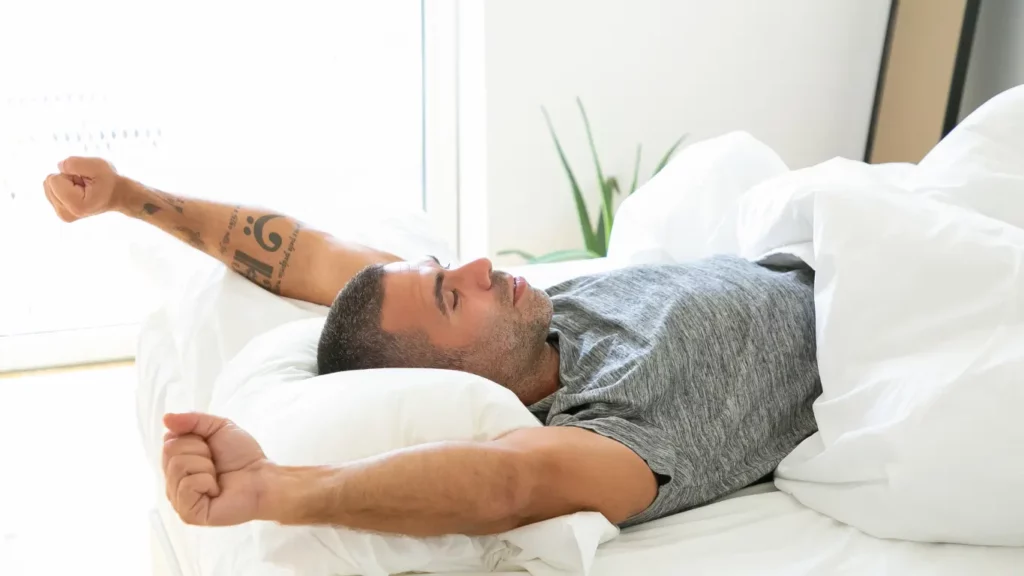Why does a man get erect in the morning?
Unveiling the Mysteries of Morning Erections

Have you ever wondered Why does a man get erect in the morning? It’s a common and natural phenomenon that has intrigued many. In this article, we’ll delve into the physiology, psychological factors, health implications, and cultural perspectives surrounding morning erections. Let’s uncover the mysteries behind this intriguing aspect of male physiology.
Physiology of Morning Erections
Role of REM Sleep
One of the primary reasons behind morning erections lies in the sleep cycle. During REM (Rapid Eye Movement) sleep, the brain is highly active, leading to increased blood flow to the genital area, resulting in an erection.
Increased Testosterone Levels
Testosterone, the male sex hormone, plays a crucial role in regulating sexual function. Testosterone levels typically peak in the early morning, contributing to the occurrence of morning erections.
Nitric Oxide’s Influence
Nitric oxide, a vasodilator, relaxes blood vessels, allowing increased blood flow. During sleep, nitric oxide production rises, promoting penile blood flow and leading to morning erections.
Read Also: Penile Pain When Erect: Understanding, Causes and Solutions
Psychological Factors
Dreams and Sexual Arousal
Sexual dreams, often experienced during REM sleep, can trigger physical responses, including morning erections. The connection between dreams and arousal adds a psychological dimension to this phenomenon.
Stress and Anxiety
Psychological factors such as stress and anxiety can impact morning erections. Understanding the interplay between the mind and body is crucial in comprehending why these factors influence morning erections.
Read Also: What Causes a Man to Erect Fast? Understanding the Triggers
Health Implications
Cardiovascular Health
Morning erections can serve as an indicator of cardiovascular health. Healthy blood flow is essential for erectile function, and any issues in this aspect might manifest during the morning.
Hormonal Balance
A balance in hormone levels, particularly testosterone, is crucial for overall health, and morning erections can provide insights into the hormonal well-being of an individual.
Erectile Dysfunction Indicators
In some cases, changes in morning erections may be early indicators of erectile dysfunction. Monitoring these changes can prompt individuals to seek timely medical advice.
Read Also: How to Erect Penis: A Guide to Achieve & Maintain Strong Erection
Tips for Managing Morning Erections
Lifestyle Changes
Incorporating healthy lifestyle habits, such as regular exercise and a balanced diet, can positively impact morning erections.
Sleep Hygiene
Improving sleep quality through good sleep hygiene practices can contribute to a healthier sleep cycle and, consequently, better morning erections.
Consultation with a Healthcare Professional
If morning erections are accompanied by concerns or persistently changed, consulting a healthcare professional is advisable to rule out any underlying health issues.
Read Also: How to Increase Erection Power: Boost Your Sexual Performance
FAQs on Why does a man get erect in the morning
Morning erections are primarily influenced by the sleep cycle, testosterone levels, and nitric oxide production.
Yes, morning erections can be an indicator of cardiovascular health and hormonal balance.
Adopting a healthy lifestyle, improving sleep hygiene, and consulting a healthcare professional if needed are ways to manage morning erections.
Yes, the intensity of morning erections can vary among individuals and may be influenced by various factors.
Yes, certain medical conditions, especially those affecting cardiovascular or hormonal health, can impact morning erections.
Conclusion
In conclusion, understanding Why does a man get erect in the morning involves a combination of physiological, psychological, and cultural factors. Embracing the normalcy of this natural occurrence and being attuned to any changes is essential for overall health. So, the next time you wake up with a morning erection, know that it’s a fascinating aspect of human biology.

